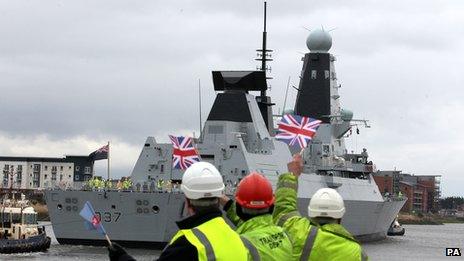Jobs for the Clyde boys
- Published

The Clyde-built Duncan is the sixth ship of its class
Defence-related jobs are among the more combustible issues in the debate about Scotland's constitutional future.
It's one of the main strands of pro-union campaigning to say that the Ministry of Defence won't buy ships from Clyde yards if they're in a foreign country, and that communities around Faslane depend on the nuclear deterrent.
They have a point. But they should be careful how they deploy it, because it's far from clear that those jobs are safe if Scotland remains within the union.
To explain... today, I watched the final Type 45 destroyer, "Duncan", depart from the Scotstoun yard for its base at Portsmouth, where it will be handed over to the Royal Navy later this week, only then becoming HMS, Her Majesty's Ship.
It's the sixth in that class of ship. And the question hanging over the BAE Systems yards at Scotstoun and across the river at Govan is what comes next.
Future frigates
The prospect of independence is only one source of uncertainty, if Whitehall opts either to build its ships south of the border, or if it sources them from competitive bidding between an independent Scotland and other ship-building nations.
The other source of uncertainty is whether the UK Ministry of Defence can afford to keep building ships, at least this decade, and to honour its commitment to BAE Systems to retain a warship-building capacity on this island.
The Type 45 destroyers have been vital to retaining more than 3,000 workers on the Clyde for the past ten years. That was the deal, which turned out to cost £6.5bn, that ensured Govan and Scotstoun remained open into this millennium.
The expectation was that the Royal Navy would place orders for the next generation of frigate, the Type 26 Future Surface Combatant. That would continue the workstream beyond the destroyers.
Of course, the aircraft carriers are keeping Govan busy with hull section fabrication, and the air control towers are being built at Scotstoun.
But the workforce is already seeing this period as "the beginning of the end" to the carrier contract. Some Clyde jobs - 700 at the moment, with more expected - involve crossing to the Forth for assembly work at Rosyth.
So as that building programme moves on, the Type 26 is going to be vital to keeping the workforce busy, and it's not going to be cutting steel until 2016 at the earliest.
Cuts ahoy
That's if the MoD budget can afford new ships. The profile of George Osborne's spending cuts is looking like biting very deeply into spending budgets. If the NHS and schools remain protected after the election, defence spending could be savaged all the more.
That's the background to the thinking - privately - that 3,000-plus Clyde shipbuilding jobs are going to have to shrink, to perhaps 1,500 or so. That may be the minimum needed to retain a shipbuilding capacity for such times as the Royal Navy can get ordering again.
Before then, and perhaps very soon, there's a decision on whether the two Clyde yards plus the one in Portsmouth (not to be confused with its naval base) can all be kept open.
All three were only going to be viable if export orders could be won, and while BAE Systems is talking about licensing its designs, most would be for building overseas, where foreign navies want to build up their own capacities.
A decision is expected soon, and Portsmouth is seen as the most likely to get the chop. That's assuming the Ministry of Defence is willing to take the risk of its remaining yards becoming residents of an independent Scotland.
All at sea
And then there's the nuclear deterrent. Getting rid of it is an article of Scottish National Party faith.
Retaining it has been an article of faith at Westminster as well.
But the Liberal Democrats in the Westminster coalition are dragging their heels about the permanently at-sea, submarine-based weapons system. Despite large spending on design and preparation, there's no commitment yet.
We've now learned that the Labour Party is reviewing whether it wants to renew the submarine-based nuclear deterrent.
The implication of that is that Labour may look at other, cheaper means of having a deterrent available. That could mean land-based or cruise missiles, neither of which would retain all the thousands of jobs which the nuclear submarines retain in and around Faslane.
So while that review is under way, it's hard to be sure whether Westminster is committed to jobs, either at Faslane or in Clyde shipbuilding, any more than nationalists are.